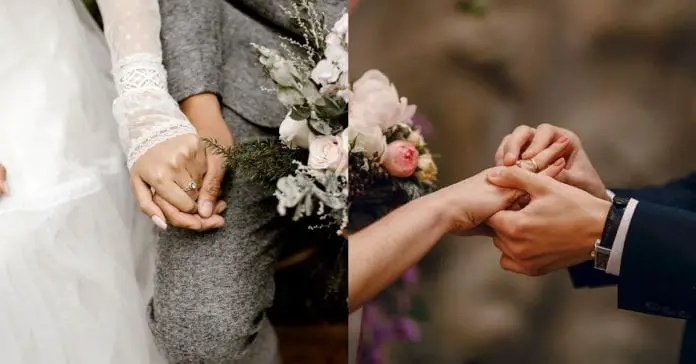The COVID-19 pandemic has upended life as we know it, and almost the whole world had a “stay-at-home” order. With that, most of everything came to a halt, including weddings. Naturally, many couples were upset that their nuptials had to be cancelled or postponed, especially if they planned on having a big wedding ceremony, as gatherings were forbidden. However, just like everything else, people found a way around it, and they organised online weddings instead. But how do online weddings work, exactly, and are they legal? We find out.
How Are Online Weddings Like?
As you’ve probably heard, “life goes on”, and some couples aren’t letting a pandemic stop them from getting married. In fact, they see this even more of a reason to cement their love for each other! Depending on each couple, there can be many types of online weddings. Some couples are physically separated, and they get married via video conferencing. Some couples are together physically, and they have a ceremony via video conferencing with their loved ones, or live stream it on YouTube, Facebook, or other apps and platforms. And going back to the question of whether these online weddings are legal, yes, it can be, depending on your location and religious authorities.

Legally Binding, Too
In Malaysia, a couple was the first to go through a virtual “akad nikah” (marriage solemnisation ceremony) on 18th April. The couple were not physically together, but they got married via video conferencing with a minister at the bride’s house. According to Islamic law and procedures, a virtual “akad nikah” is legal, so there we go. You can choose to register your marriage online at the National Registration Department (JPN) as well, but of course that’s more of paperwork than anything. For Hindus, online weddings are not “legal” despite being registered, as certain traditions have to be carried out face-to-face. As for the Christians in Malaysia, there are no guidelines, so technically, you could have an online wedding and make it count. Even Chinese weddings can be online; see below! Elsewhere around the world, different laws apply, so it’s best to consult local legislation before proceeding.

Why Should I Consider An Online Wedding?
Even if it’s not legal, you could still go ahead and have a ceremony. Having an occasion to celebrate can boost morale; not just your own, but for people around you as well. It’s also an alternative if you have certain older family members who want to witness your wedding one way or another. Besides that, you can have as many or as few guests as you like, and couples who went through online weddings said that it actually felt more personal, as they got to converse with each and every guest. Guests can also remain in the comfort of their own home, even as they dress up (their top half at least!). Last but not least, it could be considerably cheaper and easier to pull off!

What Do I Do To Organise An Online Wedding?
Depending on the current rules, you can actually organise your online wedding in a variety of ways. Here are some aspects/points to consider:
- You can either do it at your home, or even at a venue you’ve picked out, as long as you don’t break any rules of gatherings.
- You can also do your own hair and makeup, or have a makeup artist video-call-tutorial you.
- If you need flowers, delivery services are aplenty.
- You can wear your “real” wedding outfits, or substitute with what you have at home.
- Professionals suggest setting up a few tripods to capture your online wedding from different angles, but do be aware of the placements in case of echoes.
- Get a good quality microphone if you’re going to be exchanging vows or giving speeches.
- IT and tech support could be necessary to ensure your online wedding goes smoothly, so instead of a caterer, you might want to hire an IT support staff instead.
- Your photographer can still be present, and for videography you can consider recording the whole thing on Zoom.
- Consider getting a planner/emcee to take everyone through the whole wedding, so everyone knows what’s going on–you don’t want to do that while trying to get married.

And that’s about it on online weddings! Online weddings are still fairly new, so it’s a bit early to discern trends or patterns. But one thing’s for sure, it is definitely an option, whether legal or simply ceremonial. What’s your take on this? Would you consider an online wedding? Share your thoughts with us!















